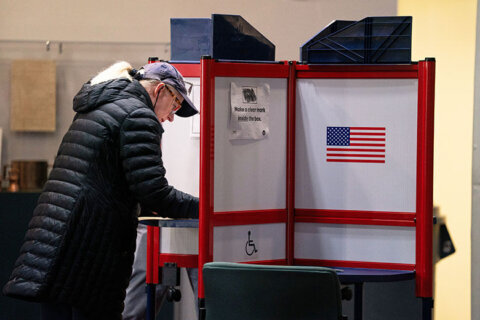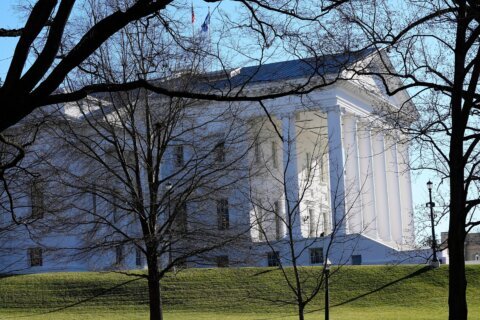From vaping, the cost of school supplies to cellphone policies, the WTOP team is studying up on hot-button topics in education across the D.C. region. Follow on air and online in our series “WTOP Goes Back to School” this August and September.
This article was reprinted with permission from Virginia Mercury.
Virginia is moving closer to restricting cell phone use in schools after the Virginia Department of Education published a draft of its “cell phone-free” guidelines on Thursday after a series of public input events.
The draft defines “cell phone-free” education as “bell-to-bell,” meaning phones should be turned off and stored away from the first school bell until dismissal. This includes lunchtime and breaks between class periods.
On July 9, Gov. Glenn Youngkin issued Executive Order 33, directing his administration to create guidelines to limit students’ time in front of “addictive” cell phones and eliminate “clear distractions” in the classroom.
The education department said over 600 community members, parents, teachers and school officials attended public events to provide input on the guidelines as well as other community events to understand concerns about cell phones and personal electronic devices.
“The extensive input we received from Virginians was clear and direct,” said Superintendent of Public Instruction Lisa Coons. “They asked for cell phones and personal electronic communication devices to be removed from our children’s public schools during the school day at every level — elementary, middle and high school. By refocusing our students’ attention back into learning and away from their phones and social media, all our children will have a better opportunity to learn and succeed academically.”
Studies have shown that students use cell phones to browse the internet and social media apps, and message people during instructional time. Students have also used the devices to record events at schools and post them on various platforms.
The draft guidance includes age-appropriate cell phone restrictions in Virginia’s elementary and secondary public schools.
According to the draft, if a parent determines an elementary student needs to bring a cell phone or personal electronic communication device to school, it must be stored, off, and away from the student during the school day. Students should not use cell phones in the school building or on the school grounds before or after school.
In middle and high school, students should not have a readily available cell phone or personal electronic communication device during the bell-to-bell school day.
Middle schools should establish local policies that determine cell phone and personal electronic communication device use within the school building or on school grounds outside of bell-to-bell, including before and after school.
Cell phones and personal electronic communication devices may be used on a high school campus before or after school.
Exemptions will be permitted for students with disabilities and EL students with a documented language barrier.
Feedback on the draft guidelines closes Sept. 15. School boards must adopt the final guidance by Jan. 1.
Some of Virginia’s school boards have already banned or restricted cell phone use in schools.







